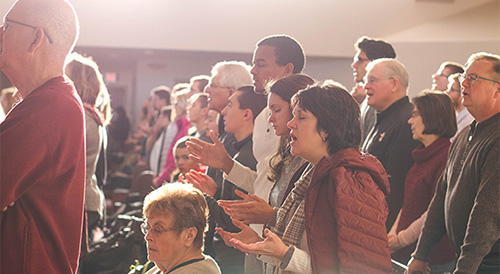Passing theology exams, having an impressive theological library or debating finer theological points is not the essence of Christian maturity. The purpose of learning the knowledge of God is so that we might walk in a manner worthy of the Lord, fully pleasing to him (Col 1:9).
These six marks of maturity are not everything, but they are essential and shape every aspect of our lives.
Love
The Apostle Paul constantly makes love the supreme mark of maturity. The fruit of learning Christ deeply is “above all” to put on love, the perfect bond of unity. We are to imitate God and walk in love as Christ also loved us and gave himself for us (Col 3:14; Eph 5:1-2).

In our immaturity we find it easier to love those we deem worthy. But Christ died for us helpless, ungodly sinners. We are totally unworthy of God’s love (Rom 5:6-8).
"Christ died for us helpless, ungodly sinners."
Cranmer had to contend with the accusation that the doctrine of justification by faith would lead to immoral living. He established the Protestant understanding that being justified by faith, we have peace with God through the Lord Jesus Christ, and that God’s love poured into our hearts transforms our way of life (Rom 5:1-5).
In Reformation Anglicanism Ashley Null writes: “For Cranmer, unconditional love was the hallmark of true Christianity. He was famous for not holding a grudge against his many enemies, no matter how close they came to bringing about his destruction. This emphasis on God’s love for the unworthy would be the common thread that ran throughout Cranmer’s subsequent theological writings.”
Cranmer’s first Book of Homilies owes its origin to the reform program he initiated with his colleagues after the Church of England broke with Rome in 1534.
His fourth homily distinguishes between a dead and lively faith. A faith bereft of unconditional love for others was no saving faith.
There is one faith which in Scripture is called a dead faith, which bringeth forth no good works, but is idle, barren and unfruitful. And such a manner of faith have the wicked and naughty Christian people which ‘confess God’, as Saint Paul saith, ‘in their mouth, but deny him in their deeds, being abominable and without the right faith’.
Another faith there is in Scripture which is not, idle, unfruitful and dead, but ‘worketh by charity’ as Saint Paul declareth; which, as the other vain faith is called a dead faith, so may this be called a quick or lively faith.
We can measure by our “charity” if we have a dead or lively faith. Let us be warned, immature faith is presumptuous and deadly.
Costly Christ-like love for others is not an optional extra, but necessary evidence of a saving, justifying faith that has enlivened our hearts.
Discernment
Paul prayed for the believers in Philippi that their love might abound more and more, with knowledge and all discernment, so that they might approve what is excellent (Phil 1:9; cf. Rom 12:1-2).
Knowledge, love and discernment are all closely connected. As we learn Christ and learn to love, the obvious question is which preacher, author or blogger has the true truth. The one who impresses, entertains and agrees with us, of course!
It’s the Corinthian problem, a cautionary tale of immaturity.
But I, brothers, could not address you as spiritual people, but as people of the flesh, as infants in Christ… For while there is jealousy and strife among you, are you not of the flesh and behaving only in a human way? For when one says, “I follow Paul,” and another, “I follow Apollos,” are you not being merely human? (1 Cor 3:1-3)

In short, the Corinthian believers lacked discernment. Paul contrasts the natural person and the spiritual person to make the point.
The natural person does not accept the things of the Spirit of God, for they are folly to him, and he is not able to understand them because they are spiritually discerned… But we have the mind of Christ (2:14-16).
Are we convinced that in the apostolic gospel we have the mind of Christ? That is an incredible claim, but it determines everything about us and about our churches. Without this conviction we are vulnerable children exposed to a litany of lies.
The root of the problem is always in our thinking.
Brothers, do not be children in your thinking. Be infants in evil, but in your thinking be mature (1 Cor 14:20).
The Greek word for “discernment” or “judgment” occurs 19 times in 1 Corinthians in its various forms. Because the Corinthian believers rejected the premise that Paul’s gospel revealed the mind of Christ, they lacked mature discernment (or judgment) in several related matters: the role of women in church meetings (11:13; 14:33-36); unworthy participation in the Lord’s supper (11:27-32); church discipline in cases of sexual immorality (5:1-13); handling lawsuits between members (6:1-8); freedoms and constraints in eating with unbelievers (10:25-30); the place of tongues over against prophecy in the building of the church (14:13-25).
Discernment is thinking theologically about all of life, the antithesis of pragmatism.
Christian growth involves identifying our discernment gaps, the gap between our convictions and practice.
Unity
We have seen in the Corinthian case that their failure to discern the true knowledge of God in the gospel led to a fractured fellowship, characterised by tribalism.

From Ephesians 4, we know that Christian unity is based on the true knowledge of God and is the essential attribute of the mature church. This kind of unity is achieved by speaking the truth of God’s word in love.
Cranmer was convinced that Christian fellowship could only be based on a common understanding of the gospel. Listen to his prayer for Christian unity from the service of Holy Communion:
Inspire continually the universal church with the spirit of truth, unity, and concord: and grant that all they that do confess your holy name, may agree in the truth of your holy Word, and live in unity and godly love.
The church whose people are shaped by the same biblical truths will learn to love one another and so live together in peace. Yet, maintaining doctrinal unity is easier said than done.
Repentance
I’m told that, as we age, we become a caricature of ourselves. How true it is. It gets harder to repent from well-worn paths and thoughts. But, as Colossians 3 says, in Christ we are dead to our old way of life, so we “put off” sin and put on lots of attributes that embody love.
Archbishop Cranmer tirelessly called the English church to the necessity of repentance. He assured us that in the name of our Saviour Christ, our perpetual advocate and priest,
our offences [will] be continually washed and purged whensoever we, repenting truly, do return to him with our whole heart, steadfastly determining with ourselves, through his grace, to obey and serve him in keeping his commandments, and never to turn back again to sin.
Is this the way we live each day, turning wholeheartedly to obey and serve our Lord in all things and resolutely refusing to play around with sin?
Endurance
I imagine by now you are feeling just a little overwhelmed, like me! How in the world can I work at this kind of maturity?
Happily, our resources are not of this world. Listen to what Paul prayed for the churches in Colossae and Ephesus: “May you be strengthened with all power, according to his glorious might, for all endurance and patience with joy”; “According to the riches of his glory may he grant you to be strengthened with power through his Spirit in your inner being”.
We are empowered by the risen, ascended King, seated at the right hand of God, the Lord who will be with us always to the end of the age by his Spirit, the Lord who is ever interceding for us.
The writer to the Hebrews gives us a surprising perspective on endurance from the experience of Christ himself.
Consider him who endured from sinners such hostility against himself, so that you may not grow weary or fainthearted. In your struggle against sin you have not yet resisted to the point of shedding your blood. And have you forgotten the exhortation that addresses you as sons?
“My son, do not regard lightly the discipline of the Lord, nor be weary when reproved by him. For the Lord disciplines the one he loves, and chastises every son whom he receives” (Heb 12:3-6).
In Calvin’s writings on bearing our cross, he helps us see God’s fatherly discipline through suffering, for our salvation and maturity.
Therefore, in the midst of the bitterness of tribulations, we should recognise the kindness and mercy of our Father toward us. For even in such tribulations, he doesn’t cease to promote our salvation. Indeed, he afflicts us not to ruin or destroy us, but instead to deliver us from the condemnation of the world (cf. 1 Cor 11:32)
Yes, you read that correctly. Affliction of all kinds is heart-wrenching and terrifying, but it is God who afflicts us to promote our salvation.
Even Jesus, God’s Son, learned obedience through what he suffered (Heb 5:8). The promise of Christ’s presence, his faithful endurance of the cross and our Father’s loving discipline are powerful incentives for a life of prayer.
Thankfulness
Our natural instinct in facing hardship is to doubt God’s goodness or even his knowledge of us. We misread what God is like and his intentions for us, rather than going back to the foundation of maturity, our certain knowledge of God in Christ.

Thankfulness is a constant learning process. No matter what is happening in life, these realities about the Father’s grace toward us never change. He has qualified us to share in the inheritance of the saints in light. He has delivered us from the domain of darkness and transferred us to the kingdom of his beloved Son, in whom we have redemption, the forgiveness of sins (Col 1:12-14).
We have come full circle. Being filled with the true knowledge of God, we can be thankful even when all hell (in a manner of speaking) breaks loose.
So, who are the really mature Christians in your church? What’s the grid that we use to measure maturity? Always serving on rosters, hospitable, bold in evangelism, following up newcomers, committed to church life generally? Yes, these are some of the fruits of maturity. But let’s be careful we don’t focus on external activity and miss the heart of maturity, mistaking a dead faith for a lively faith.
Colin Marshall is founder of the Vinegrowers ministry, co-author of The Trellis and the Vine and The Vine Project and was director of the Ministry Training Strategy (MTS) from 1991-2006.























